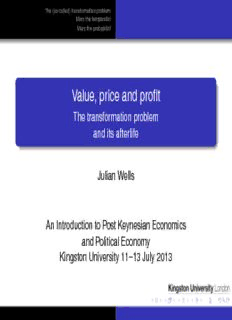Table Of ContentThe(so-called)transformationproblem
Marxthetemporalist
Marxtheprobabilist
Value, price and profit
The transformation problem
and its afterlife
Julian Wells
An Introduction to Post Keynesian Economics
and Political Economy
Kingston University 11–13 July 2013
8
7-0 VTahelutrea,nspforircmeataionndpropbrloemfit
0 anditsafterlife
3- JulianWells
1
0 AnIntroductiontoPostKeynesianEconomics
2 KingstoannUdnPivoelirtisciatylE11c–o1n3omJuyly2013
Reading
1. Preliminary: BrendanMcCooneyvideosat
http://www.youtube.com/user/brendanmcooney;Marx:
WageLabourandCapital,Value,PriceandProfit (also
publishedunderthetitleWages,PriceandProfit);Freeman
(1995);Wells(2013);Wright(2005)
2. Further: Kliman(2007)ReclaimingMarx’s“Capital“;Kliman
(2012)TheFailureofCapitalistProduction;Farjounand
Machover(1983)LawsofChaos;AllinCottrelletal. (2009)
ClassicalEconophysics.
3. Marx: Capital (butyouknewthat),andreferencesgiveninnotes
andslides.
4. Myweb-site: http://fass.kingston.ac.uk/faculty/
staff/cv.php?staffnum=287
The(so-called)transformationproblem
Marxthetemporalist
Marxtheprobabilist
How to use this document
If you are viewing this document on screen you should be using
a file called VPPshow.pdf; if so, you do not want to try printing
from it.
Instead, look to see if you also have a file called
VPPnotes.pdf. In this file each slide has an accompanying
Notes page.
You may want to print out this file so that the slides are laid out
in n×2 format, where n is the number of rows. If you want to
addyourownnotes2×2isgoodinA4landscapeformat;4×2
in portrait format works if you don’t mind small type.
8 Howtousethisdocument
0
07- Howtousethisdocument Iaffroyfimoleuicta.arlelevdieVwPiPnsghtohiws.dpodcfu;mifesnot,oynouscdroeennotyowuansthtooutldrybperiunstiinngg
13- IVNYnoPosuPtteenmasodatpy,ealwogsoea.k.npttdotfos.peIrneintifhtyiosouufitlteahliessoafichlheasvsleoidatehfiahltaetshceaanllselaiddcecsomarpealnayidinogut
20 iainndnpdo×yrotr2uarfitoofrwomrnmanta,otwtwehsoerr2kes×ni2fisyiosthugeodnooudnm’itnbmAeinr4dolafsnrmodwaslcsl.atypIfpeyeof.ourmwaatn;t4to×2
Notes
The(so-called)transformationproblem
Marxthetemporalist
Marxtheprobabilist
Outline
1 The (so-called) transformation problem
Prologue
Why it matters: the falling rate of profit
The problem posed and answered
The problem problematised
2 Marx the temporalist
The Temporal Single System Interpretation
Is Marx a temporalist?
3 Marx the probabilist
Dissolving the transformation problem
Econophysics and complexity
Is Marx a probabilist?
8 Outline
0 1The(so-called)transformationproblem
7- PWrhoyloigtumeatters:thefallingrateofprofit
13-0 Outline 2MaTTTIrsxhhhMeeethappTererrxootmebbamplleetopemmromarpplpaSoroloisisrnbeatgldleilsemat?nSadtyissaetendmswIenrteedrpretation
0 3Marxtheprobabilist
2 DEcisosnoolvpihnygstihcseatrnadnscfoomrmpaletixoitnyproblem
IsMarxaprobabilist?
Notes
1. Prologueexplainstheallegedproblem,andhowitcametobe
re-problematisedafterMarx’ssolution.
2. TSSI:‘makingsenseofMarx’—althoughitis‘20thcentury
Marxism’thatmadenonsenseofMarx. Fallingrateofprofit
(LTRPF):‘ineveryrespectthemostimportant’(Marx–source?).
3. T-problemisalogicalproblemrelatingtoaspecial
case—permanentactualequalisationnotonlyofprofitsbutof
marketprices;inotherwords,‘perfectcompetition’.
4. TheworldMarxwantedtochangewas‘actually-existing’
capitalism,sohowshouldweinterprethistheory?
Prologue
The(so-called)transformationproblem
Whyitmatters:thefallingrateofprofit
Marxthetemporalist
Theproblemposedandanswered
Marxtheprobabilist
Theproblemproblematised
What this is about ...
... andwhatit’snot
It’s about interpretation
isMarxatheoristofequilibriumordisequilibrium?
CompareKeynes...
and disproving claim that Marx’s theory is logically
incoherent
henceallowinghisotherworktobeconsideredseriously
inparticular,fallingrateofprofitasbasisofcapitalistcrisis
It’s not about ‘correcting’ or ‘completing’ Marx
neithernewmethodsnornewsolutions
notprovingMarx’svaluetheorycorrect
especiallynotprovingthateverythinghewrotewastrue
emphatically not about re-interpreting Marx
08 The(so-called)transformationproblem W...hanadtwthhatisit’sinsotabout...
13-07- ProlWoghuaetthisisabout... Iaint’nscdoahdihibsneieosMrpnupeacatrnerCorittxniovacmtiaulenloplrgatwahprr,ecirenefolaagKtrlaiielsmhitnytiinsogotenhofrsataeh.tqte.eu.Mroilwafibporrxriruok’smfittothoaberseodbricasyoesniiqsssuioldiolfiebgcrrieaicudpamilstla?yelrisiotucsrilsyis
20 It’snnneoeostpitathepbecrooiravunliltnye‘gwcnoMomrtarepertrxcho’stovindivnsgag’lnutooherrat‘nthceeeovwomerysrpyocltelhoutirtinirnoeggnch’steMwarroxtewastrue
emphaticallynotaboutre-interpretingMarx
Notes
Fundamentalprincipleofinterpretation(hermaneutics): canthe
authorbereadinsuchawayastomaketheirargumentmakesense?
Especiallynecessarywhenthetextisincompleteordoubtful;vol.sII
andIIIofCapital areboth. Hencenotaboutre-interpretingtofitin
withsomeotherpreferredperspective.
Prologue
The(so-called)transformationproblem
Whyitmatters:thefallingrateofprofit
Marxthetemporalist
Theproblemposedandanswered
Marxtheprobabilist
Theproblemproblematised
Two quotations...
... andtwointerpretations
IfM.Proudhonadmitsthatthevalueofproductsisdeterminedby
labourtime,heshouldequallyadmitthatitisthefluctuating
movementalonethatinasocietyfoundedonindividualexchanges
makeslabourthemeasureofvalue. Thereisnoready-made
constituted‘proportionalrelation’,butonlyaconstitutingmovement.1
[T]herateofprofit... seeksthe‘ideal’meanposition,i.e.amean
positionwhichdoesnotexistinreality. Inotherwords,ittendsto
shapeitselfaroundthisidealasanorm.2
1ThePovertyofPhilosophy: 71(emphasesadded)
2Capital Vol. III:273
8 The(so-called)transformationproblem T..w.aondqtwuoointtaertpiroetnatsio.ns..
0
7- Prologue IlafbMo.uPrrtoimudeh,ohneashdomuitldstehqautathllyeavdamlueittohfaptriotdisucthtseiflsudcetuteartminginedby
0 movementalonethatinasocietyfoundedonindividualexchanges
3- Twoquotations... mcoanksetistulatebdou‘prrothpeormtieoansaulrreelaotfiovna’l,ubeu.tTohnelryeaiscnoonsrteitaudtiyn-gmmadoevement.1
1 [T]herateofprofit...seeksthe‘ideal’meanposition,i.e.amean
0 pshoasiptieonitswehlficahroduonedstnhoistiedxeiastlainsraeanloityrm.I.n2otherwords,ittendsto
2
12TChaepiPtaolvVeortl.yIoIIf:P2h7i3losophy:71(emphasesadded)
Notes
BothcitedinFreeman(1995): eachquotationsupportsboth
temporalistandprobabilistinterpretations
1. Temporalism,becauseMarx’stheoryisdynamic,i.e. movement
intime
2. Probabilism,becausenon-equalisationatanygivent meanswe
havetoconsiderdistributionsofvariablesincross-sectionas
wellaslongitudinally,whichisasfarasthe‘gravitation’school
gets;seeergodicitybelow
Description:The (so-called) transformation problem. Marx the temporalist. Marx the probabilist. Value, price and profit. The transformation problem and its afterlife. Julian Wells. An Introduction to Post Keynesian Economics and Political Economy. Kingston University 11–13 July 2013

